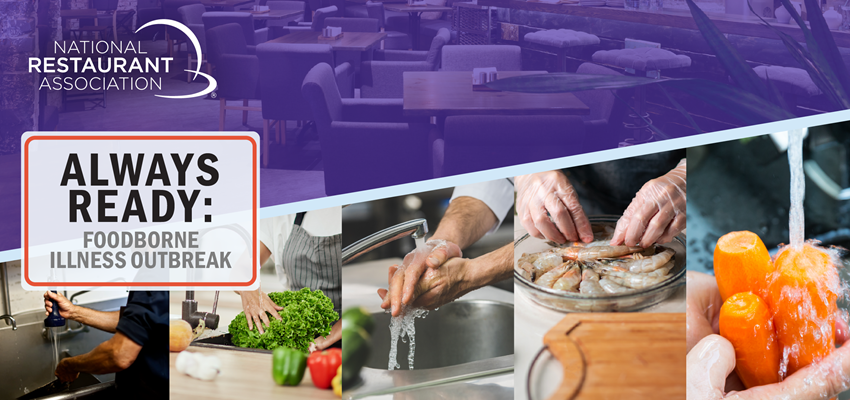Paying employees when a crisis closes your restaurant

Employees like working for companies that help, support, and value them. They’ll look to you to be a calm voice of reason after a crisis.
Having a crisis plan in place to prepare for what to do and how to recover will help give you peace of mind. (Download a free copy of the National Restaurant Association’s industry-specific Always Ready crisis preparation guides.)
Even if you are prepared, you run a 25% chance of being unable to reopen after a catastrophe, according to the U.S. Small Business Association. Restaurants forced to close by a natural disaster, though, may still have obligations to their employees. You should know what those responsibilities are and make them a part of your disaster plan, just in case. Here are some of the key steps to take after a disaster based on federal law, but your state may also have additional requirements.
Communicate with your staff. Be as honest and open as you can. Employees like working for companies that help, support, and value them, and they’ll look to you to be a calm voice of reason after a crisis. Give them an assessment of the damage to the business caused by the crisis, whether you’ll be able to operate, even on a limited basis, or whether you’ll have to close. If so, let them know if you have plans to reopen after insurance has helped you rebuild, if you’ll move to a new location, or if the closure will be permanent.
Outages may make communication difficult, so use all the tools at your disposal to stay in touch, including texts, social media, your website, email, and even an old-fashioned phone tree if you set it up as part of your disaster recovery plan.
Properly WARN employees of your plans if you think you might close or lay off staff. The federal Worker Adjustment and Retraining Notification (WARN) Act requires employers with at least 100 full-time employees to provide at least 60 days’ notice prior to closing a restaurant or facility. Obviously, disasters are an exception, but the law requires you to provide “as much notice as is practicable,” and a reason why you didn’t provide normal notice. Proper notice must include:
- Whether you expect permanent or temporary closing or layoffs.
- The date you’re closing the restaurant or making layoffs.
- Whether bumping rights exist in the event of layoffs.
- Contact information for a company official who can provide more details.
The federal Fair Labor Standards Act (FLSA) requires that you pay non-exempt workers regular wages for the hours they worked up to the disaster, and any overtime hours (those in excess of 40 per week) at one-and-a-half times their regular rate of pay. (See the U.S. Dept. of Labor Fact Sheet #2 for general requirements for restaurants and USDOL Fact Sheet #72 for specific information on pay during a disaster and recovery.)
You’re also responsible for paying exempt employees their full salary even if your restaurant is closed or unable to reopen due to inclement weather or other disasters for less than a full workweek. However, you can apply accrued sick days, vacation days or leave time against the amount owed.
Keep accurate time records if you’re able to operate in some fashion. The Liability Protection for Employers in a Declared Disaster or Public Emergency Act allows you to operate without the threat of civil liability or professional disciplinary action if you make a good faith effort to comply with applicable federal, state, or local regulations. Rather than close after Hurricane Irma, for example, Snappers in Key Largo, Fla., set up an outdoor grill and makeshift bar and served a limited menu. Without power, though, the restaurant could only accept cash, and kept track of staff hours the old-school way, with pencil and paper timesheets.
If time records for work already performed get lost in a disaster (although you should always back them up as part of your storm prep), try to recreate them in the most accurate way possible from both your and the employee’s recollection. Make sure that employees acknowledge that they are using their best recollection and authorize corrections if additional information becomes available.
Accommodate employees and offer leaves. Employees or their family members may face disability or health issues following a disaster, and you should be prepared to assist them. The Family and Medical Leave Act (FMLA) entitles eligible employees or covered employers to take up to 12 weeks of unpaid, job-protected leave. And the Americans with Disabilities Act (ADA) requires employers to make reasonable accommodations for employees with physical or mental disabilities, which may be difficult if your restaurant is damaged in a disaster.
Some of your employees, such as those in the National Guard or Reserves, also may be called upon to serve as relief workers. Their jobs may be protected by the Uniformed Services Employment and Reemployment Rights Act (USERRA) based on their armed forces service. Some states have their own laws modeled after USERRA; other states, such as California, have state family leave laws even more stringent than the FMLA.
Get creative with financial support. While you may have lost your restaurant—temporarily or even permanently—employees may have lost homes, or even loved ones. This is the time to help each other. Some of the ways you can help:
- Encourage staff members to apply for unemployment. Unemployment benefits vary by state, so employees will have to check to see if they’re eligible for benefits, and when.
- Find out if your state has a disaster assistance program. Some states have programs like Louisiana’s Disaster Unemployment Assistance, available to employees whose jobs are lost due to natural disasters.
- Provide loans and hardship distributions. If you offer a 401(k) or other retirement plan, let employees know they may be eligible for loans or hardship distributions if they work or live in counties recognized as a disaster area by FEMA. You can find more information on relief granted in the past by the IRS here.
- Offer cash advances. After Hurricane Katrina in 2005, Red Fish Grill, New Orleans, couldn’t make payroll because flooding knocked out the bank’s ability to handle transactions digitally. Since then, owner Ralph Brennan writes a $500 check for all employees when disaster strikes and balances the books later.
If you offer employees a COBRA-covered health insurance plan, you’re required to send COBRA notices and election forms to employees who’ve lost their jobs due to your restaurant closing, even if they, too, have been displaced by the disaster. You should send COBRA notices to the employee’s last known physical address, as well as send electronic notices to any email addresses on file. Send text messages to displaced employees and encourage them to update their contact information, even on a temporary basis.
Also, give employees a little leeway in making COBRA payments. The law requires a 30-day grace period for late payments, but that can be flexible after a disaster. You should act in the best interests of former employees and families who rely on health plans.
Natural disasters can result in losses for both restaurants and their employees. While there are certain steps you must take as an employer after potentially losing your business that are difficult, the more you help employees in the recovery process, the more likely your best employees will want to help you get your restaurant back on its feet.
For more information on what you’re required to do, check out these additional resources from Restaurant Law Center Law Firm Partners:
- SheppardMullin, LLP: Employers Under Fire: How To Address Employee Pay And Related
- Issues When Faced With Natural Disasters
- JacksonLewis, P.C.: After the Storm: Employers Obligations Following Natural Disasters
- Fisher & Phillips, LLP.: Comprehensive FAQs For Employers on Hurricanes and Other Workplace Disasters: 2023 Edition
-
Heartland
![Heartland Logo]() Heartland
HeartlandHeartland is a proud partner of National Restaurant Association, as the point of sale, payments, and payroll solution of choice for entrepreneurs who need human-centered technology to sell more, keep customers coming back and spend less time in the back office. Nearly 1,000,000 businesses trust Heartland to guide them through market changes and technology challenges so they can stay competitive and focus on building remarkable businesses instead of managing the daily grind. Heartland is a Global Payments Company (NYSE: GPN). Learn more at Heartland.us.

